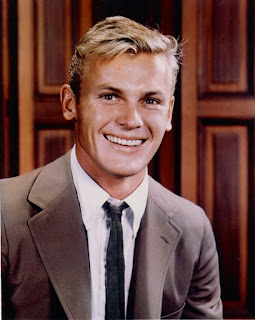 |
| Ad for Tab Hunter Confidential, 2015. |
 |
| Tab Hunter, 1931-2018. It's all about those eyes and that smile. |
The 2015 documentary Tab
Hunter Confidential, directed by Jeffrey Schwarz, is a fascinating look at
one of the biggest teen idols of the 1950’s. The documentary is based on Tab
Hunter’s 2005 autobiography, Tab Hunter
Confidential: The Making of a Movie Star, and is centered on interviews
with Hunter himself.
Of course, Tab Hunter wasn’t his real name. He was born
Arthur Kelm, and he later took his mother’s maiden name of Gelien after his
parents’ divorce. He was renamed by the agent Henry Willson, who had a stable
of handsome young actors under contract to him. Some of Willson’s clients were
Guy Madison, Rory Calhoun, Troy Donahue, Robert Wagner, and Clint Walker. But
Willson’s biggest discovery was a tall, dark and handsome actor who was born
Roy Scherer, and later known as Roy Fitzgerald after his mother remarried.
Willson gave Roy Fitzgerald the unlikely name of Rock Hudson, and he went on to
become one of the most successful actors of the 1950’s and 1960’s. (Hudson and
Hunter’s names later inspired the title of the satirical play and movie, Will Success Spoil Rock Hunter?)
Like Hudson, Hunter was also a gay man who kept his
sexuality hidden; for fear that his career would be ruined. After several
successful films, Hunter was signed by Warner Brothers, and the studio gave him
a huge publicity push. Hunter’s big break came in the 1955 movie Battle Cry, which was the 3rd
highest-grossing movie of the year. Hunter was a constant presence in movie
magazines, and the studio engineered dates with Hunter and various young
starlets. As one of those actresses says in the movie, “It was just like a
regular date, only there was a third person along, and that third person was a
photographer.” Warner Brothers paired Hunter with Natalie Wood in two 1956
movies, The Burning Hills, and The Girl He Left Behind, and their “dates”
were breathlessly chronicled in movie magazines.
Hunter’s relationships with actor Anthony Perkins and ice
skater Ronnie Robertson are examined in the film, and Hunter describes the
strain of living a private life that couldn’t be public. Hunter was raised
Catholic, and he speaks about how the church made him feel unwelcome because of
his sexuality.
Tab Hunter had a lot of different interests, including ice
skating and horse riding. He was also a pretty good singer, and in 1957 he
embarked on a musical career, scoring a huge hit with “Young Love,” which had a
five week run at Number One. Hunter recorded “Young Love” for the Dot record
label, and the record’s success prompted studio head Jack Warner to create
Warner Brothers Records for Hunter to record on.
1958 was probably the peak year of Hunter’s career, as he
appeared in Gunman’s Walk, Lafayette
Escadrille, and the classic musical Damn
Yankees. In Damn Yankees, the
main character, Joe Boyd, agrees to sell his soul to the devil if his beloved
Washington Senators can beat the New York Yankees and win the American League
pennant. Boyd is then transformed into youthful, handsome, athletic, all-American
Joe Hardy. With his wholesome good looks and boy-next-door charm, Hunter was
the perfect choice to play Joe Hardy.
As Hunter’s career waned in the early 1960’s, he spent more
time riding horses, competing in steeplechase events around the country. Hunter
spent most of the 1970’s performing in dinner theater, before returning to
movie screens in John Waters’ 1981 film Polyester.
The unlikely pairing of Hunter with drag performer Divine was a hit, and
they worked together again in 1985’s Lust
in the Dust. In the early 1990’s, Hunter quietly retired from acting and
devoted himself full time to his horses, and his life with his partner Allan
Glaser.
It’s so much fun to see Tab Hunter’s positive attitude throughout
the documentary. He clearly has a sense of humor about his career, and the
various ups and downs he faced. When he discusses the 1962 film, The Golden Arrow, Hunter says with a
smile, “At least I got to ride a flying carpet.” Hunter doesn’t seem to have
any bitterness about the hand life dealt him, and he speaks honestly about the
difficult times in his life—like his mother’s mental illness, and his
brother’s death in the Vietnam War.
In the documentary you can also see how well Tab Hunter aged—he
was in his 80’s when these interviews were filmed, but he looks about 20 years
younger than that. His intense blue eyes and his winning smile are just the
same as they were in the 1950’s. I said to my wife towards the end of the
movie, “He never took a bad picture, did he?”
On a personal note, my Mom was a big fan of Tab Hunter’s in
the 1950’s, and she’s always retained an affection for Hunter—I suspect
that his love of horses probably had something to do with it. In Tab Hunter Confidential, you get a sense
of the kind of man he was, and he seems like a really cool guy. I’m also happy
that Hunter lived long enough to see attitudes towards homosexuality change,
and that he could live his life freely and openly.



